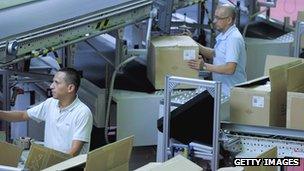Spain's manufacturing activity 'stable' in June
- Published

The eurozone crisis has hit Spain particularly hard
Spain's manufacturing activity recorded its strongest reading for more than two years in June, suggesting the sector's long contraction may have stabilised.
A rise in new orders pushed Spain's purchasing managers' index, external (PMI) up to 50, from 48.1 in May.
The monthly industry survey provides a snapshot of industry conditions and a reading above 50 indicates growth.
Meanwhile, separate data showed that the eurozone unemployment rate, external reached 12.2% in May, its highest level ever.
Unemployment across the 17-countries, according to the European Union statistical agency, was just above April's figure of 12.1%, which had been revised down from an earlier estimate of 12.2%, making May's figure the new record.
Other economic data released by Eurostat on Monday showed inflation in the eurozone rose to 1.6% in June, from 1.4% in May.
June's figure is comfortably below the European Central Bank's target of 2%.
European Union leaders held a summit last week which put joblessness at the top of its agenda, and agreed to launch a special scheme for young jobless Europeans.
'Encouraging note'
The PMI survey suggested conditions in the manufacturing sector were stabilising across the eurozone, with the reading for the bloc as a whole rising to 48.8 - 16-month high, albeit still below the 50-level that marks the difference between expansion and contraction.
However, Germany's reading fell following a drop in new orders.
June's PMI reading for Spain was the first time in 26 months the index has reached 50, indicating that the country's manufacturing sector may have bottomed out following a prolonged contraction.
The figures are compiled by research firm Markit, and they were hailed as a promising sign by Markit's senior economist, Andrew Harker.
"The second quarter of 2013 ended on an encouraging note for the Spanish manufacturing sector, with PMI data pointing to a rise in new business," he said.
However, the country's manufacturing sector accounts for just 12% of its total economy, and Mr Harker said growth was coming from exports with little sign of improved domestic demand.
Spain has been among the worst-hit economies by the eurozone crisis. It has not seen significant growth for five years and has high unemployment.
Growth engine
In Germany, a fall in orders pushed its manufacturing PMI reading down to 48.6 in June, from 49.4 in May.
Germany's manufacturing sector accounts for about 20% of its economy and has helped it to become the best-performing economy in the eurozone.
The country had been able to offset weakness in the bloc, where it traditionally sells the biggest percentage of its goods, by sales to faster-growing places, such as China.
But despite making cuts to its prices, weaker economic growth there has been curbing demand and Germany came close to recession this year.
Update 2 July 2013: An earlier version of this article stated that the April unemployment rate was a revised 12%, and the May rate 12.1%. This was based on erroneous data published by Eurostat, which has since been corrected.
- Published1 July 2013
- Published1 July 2013
- Published1 July 2013
- Published6 June 2013